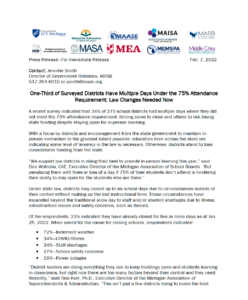 A recent survey indicated that 34% of 275 school districts had multiple days where they did not meet the 75% attendance requirement, forcing some to close and others to risk losing state funding despite staying open for in-person learning.
A recent survey indicated that 34% of 275 school districts had multiple days where they did not meet the 75% attendance requirement, forcing some to close and others to risk losing state funding despite staying open for in-person learning.
With a focus by districts and encouragement from the state government to maintain in-person instruction to the greatest extent possible, educators from across the state are indicating some level of leniency in the law is necessary. Otherwise, districts stand to lose considerable funding from the state.
“We support our districts in doing their best to provide in-person learning this year,” said Don Wotruba, CAE, Executive Director of the Michigan Association of School Boards. “But penalizing them with fines or loss of a day if 75% of their students don’t attend is hindering their ability to stay open for the students who are there.”
Under state law, districts may cancel up to six school days due to circumstances outside of their control without making up the lost instructional time. Those circumstances have expanded beyond the traditional snow day to staff and/or student shortages due to illness, infrastructure issues and safety concerns, such as threats.
Of the respondents, 23% indicated they have already closed for five or more days as of Jan. 25, 2022. When asked for the cause for closing schools, respondents indicated:
- • 72%—Inclement weather
- • 34%—COVID/Illness
- • 34%—Staff shortages
- • 27%—School safety concerns
- • 19%—Power outages
“District leaders are doing everything they can to keep buildings open and students learning in classrooms, but right now there are too many factors beyond their control and they need flexibility,” said Tina Kerr, Ph.D., Executive Director of the Michigan Association of Superintendents & Administrators. “This isn’t just a few districts trying to make the best
decision possible with the cards they’ve been dealt. It’s absolutely a statewide issue affecting districts of all sizes and in all areas across the state.”
School leaders anticipate these challenges will continue to impact attendance for the remainder of the school year.
“Parents have the ability to make the best decisions for their child in terms of attendance during a pandemic and amid noncredible threats like we saw last fall,” said Peter Spadafore, Executive Director of the Middle Cities Education Association. “School leaders want to ensure as many children as possible are safely in classrooms for as many days as possible. We need the law to reflect those choices and make it easier for districts to offer safe in-person learning and support those students who stay home.”
Some district examples as of Jan. 25, 2022, include:
- • Belding Area Schools—Closed in mid-January for a day because of increased illness in the district between COVID and the flu. If they were to open, they wouldn’t have hit the attendance requirement.
- • Central Lake Public Schools–This small rural district in northern Michigan has closed for seven days and had four others where attendance was below 75% since late October. They’ve lost days due to weather, power outages and an unsafe water issue and will face a financial penalty for the four days they were in school but under the required attendance rate.
- • Oakridge Public Schools—Muskegon County school districts had several copycat threats deemed not credible by law enforcement. Oakridge had school the next day, but parents kept 49% of students home.
- • Thornapple-Kellogg Schools—The district received a threat to the high school. Closing the high school would have put them at roughly 65% attendance for the district. They closed the district and used a forgiven day instead since they couldn’t meet the 75% attendance threshold.
AFT Michigan, Education Advocates of West Michigan, Michigan Association of Administrators of Special Education, Michigan Association of Intermediate School Administrators, Michigan Association of School Boards, Michigan Association of Secondary School Principals, Michigan Association of Superintendents & Administrators, Michigan Education Association, Michigan Elementary and Middle School Principals Association and Middle Cities Education Association have been asking legislators to modify the attendance requirement law since the school year began.
We now have data to back up this request and need our legislators to act before it’s too late.
###
